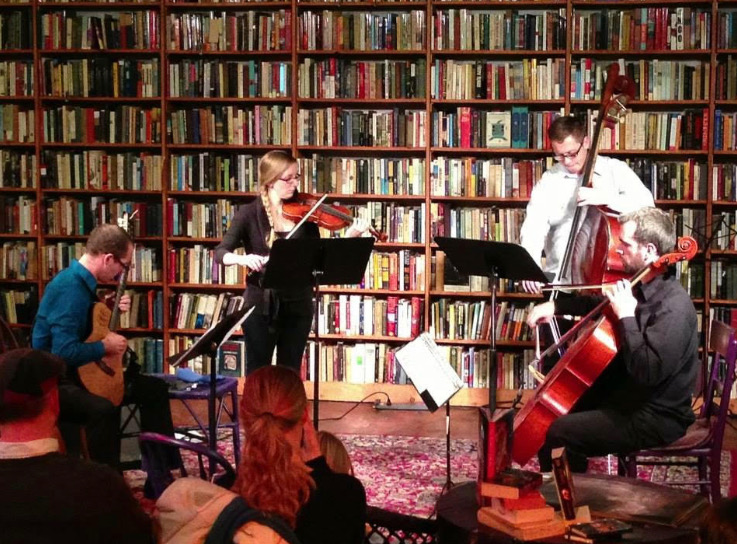Cleveland bassist hopes for improvement
Joel Negus (standing on right) performs at the Tome Canvas Concert at Loganberry Books in Larchmere.
January 11, 2019
He’s a pastor, dad, husband, and a musician on the side.
Joel Negus is a full-time pastor but plays the bass on the side as a sub-vocation. He spends the majority of his time at work or with his family, but still practices his bass because he wants to improve.
Negus attended the Cleveland Institute of Music and was part of the very first YouTube symphony; he has performed at a variety of events at locations like Severance Hall and Carnegie Hall. In addition, Negus attended a prestigious summer training camp for artists called the music academy of the west. In the past, he was part of a now-successful rock band known as Born of Osiris but left before it became it better known.
Negus decided the bass was his instrument for two main reasons. He said, “Originally it was because I thought it was the instrument that would impress the most girls. Music was about the only thing I was interested in growing up [and the] bass was in music [and] that was what I was good at.”
His desire to improve stemmed from his definition of a creative artist and what one needs to do be be called a creative artist. He said, “A creative artist that doesn’t want to improve isn’t a creative artist. The concept of creating new sounds and new experiences is kinda what it means to be a creative artist; so, if I’m not improving then I’m not able to do what I’m supposed to be doing as an artist.”
Negus understands that if he does not practice, his skills will slip and he won’t be improving in any way. He said, “I think as this being part of my vocation, I think I would say stagnant and in some ways my playing would deteriorate but in a lot of ways my college years were kinda foundational in the three to six hours a day that I was spending then was setting my ability range or what I would be able to do on the instrument.”
Social studies teacher Michael Hughes, who is also in band, believes that practice exercises creative. He said, “You lose your technical abilities but then you also lose your creativity as well because you have to practice being creative. Some people think that it’s [out of] the blue that you get the inspiration to write a song and even musicians like Paul McCartney said he wrote Yesterday in 30 minutes, it was over; but he created systems where he allowed himself the time to be creative before that so the creative juices were flowing.”
The area he wants to improve is less the playing of the bass but more the interacts he gets to have with people through his playing. He said, “I think at this point, I’m less concerned about being the best technician on the instrument and doing everything perfectly; I think I’m most interested in improving in the concept of sharing experience[s] with people and just thinking on a higher level about how I connect with individuals, with people through my art form.”
His time to practice decreased greatly from when he practiced during college. He said, “[The time spent is] a lot different than it used to be. In college, I was practicing anywhere between three to six, sometimes eight hours a day and that was my studies; that was like doing homework. As a professional, it’s particularly who’s bi vocational [ministers with other jobs]; it has to be either late at night or early in the morning.”
Negus’ wife, Allison, explained her husband’s mindset after college due to his career change.. She said, “His mindset in college was that he would be a professional orchestral bassist. That changed after he graduated and felt like he should pursue pastoring instead.”
She also explained how he loves music but doesn’t focus on it. She said, “So while he still loves music and has a great passion for it and pursues that in some areas, that’s not his full-time vocation; and that is because he felt a called from the Lord to pursue being a pastor.”
College practice hours differ a great deal from current practice periods. Negus said, “Now I’m good if I get 20 minutes a day, 30 minutes a day but I play a lot. You are getting practice when you’re gigging, when you’re playing with orchestras and rehearsing with orchestras. But individual practice time maybe 20, 30 minutes a day and that’s on average.”
Practice times can differ according to Hughes because it is based on the person’s skills and comfort zone. He said, “I think it does differ person to person. Some people are going to do better if they practice multiple hours at once; some people don’t to get into that flow state, you don’t need more than 15 or 20 minutes for some people. It all depends on what level you’re at, what your goals are, the technical abilities that you have or don’t have. I don’t think there’s a set amount of time for any one person.”
Allison Negus believes that Negus is capable of taking his skills beyond what he is doing at the moment but is also content with where he is for the time being. She said, “I think he could do more than what he’s doing right now in the future. I think that if he practiced and put his mind to it, he could definitely achieve a place in the Cleveland Orchestra, perhaps a sub for them to start. As it stands right now, he’s doing plenty musically.”






















































